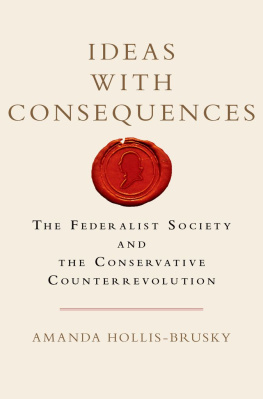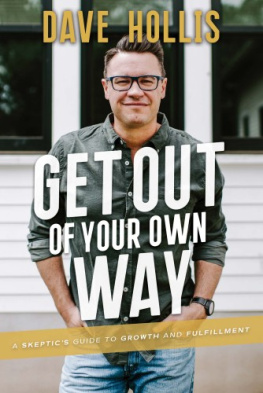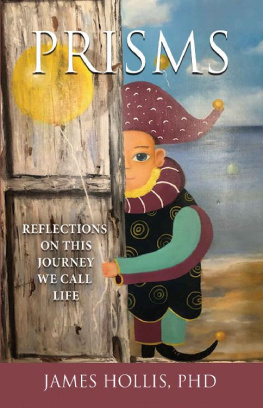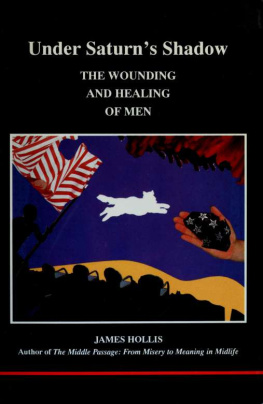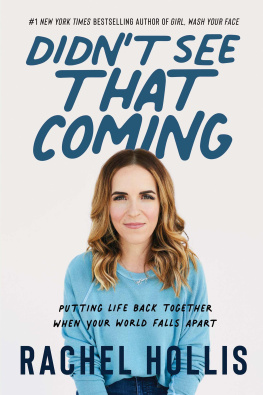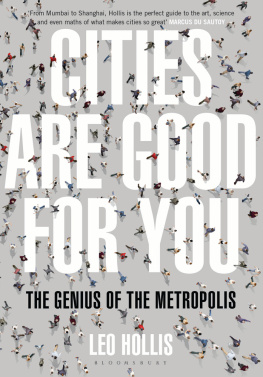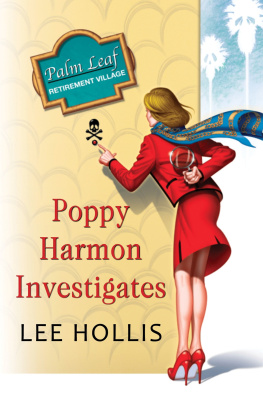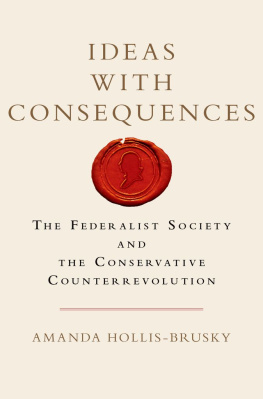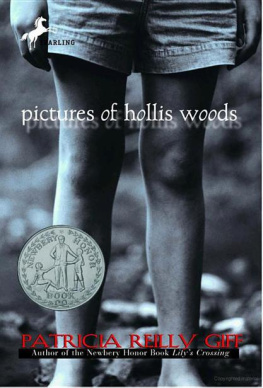Hollis-Brusky Amanda - Ideas with Consequences
Here you can read online Hollis-Brusky Amanda - Ideas with Consequences full text of the book (entire story) in english for free. Download pdf and epub, get meaning, cover and reviews about this ebook. year: 2014, publisher: Oxford University Press, genre: Politics. Description of the work, (preface) as well as reviews are available. Best literature library LitArk.com created for fans of good reading and offers a wide selection of genres:
Romance novel
Science fiction
Adventure
Detective
Science
History
Home and family
Prose
Art
Politics
Computer
Non-fiction
Religion
Business
Children
Humor
Choose a favorite category and find really read worthwhile books. Enjoy immersion in the world of imagination, feel the emotions of the characters or learn something new for yourself, make an fascinating discovery.
- Book:Ideas with Consequences
- Author:
- Publisher:Oxford University Press
- Genre:
- Year:2014
- Rating:4 / 5
- Favourites:Add to favourites
- Your mark:
- 80
- 1
- 2
- 3
- 4
- 5
Ideas with Consequences: summary, description and annotation
We offer to read an annotation, description, summary or preface (depends on what the author of the book "Ideas with Consequences" wrote himself). If you haven't found the necessary information about the book — write in the comments, we will try to find it.
Ideas with Consequences — read online for free the complete book (whole text) full work
Below is the text of the book, divided by pages. System saving the place of the last page read, allows you to conveniently read the book "Ideas with Consequences" online for free, without having to search again every time where you left off. Put a bookmark, and you can go to the page where you finished reading at any time.
Font size:
Interval:
Bookmark:

Steven Teles, Series Editor
Series Board Members
Jennifer Hochschild
Desmond King
Sanford Levinson
Taeku Lee
Shep Melnick
Paul Pierson
John Skrentny
Adam Sheingate
Reva Siegel
Thomas Sugrue
The Delegated Welfare State: Medicare, Markets, and the Governance of Social Policy
Kimberly J. MorganandAndrea Louise Campbell
Rule and Ruin: The Downfall of Moderation and the Destruction of the Republican Party, From Eisenhower to the Tea Party
Geoffrey Kabaservice
Engines of Change: Party Factions in American Politics, 18682010
Daniel DiSalvo
Follow the Money: How Foundation Dollars Change Public School Politics
Sarah Reckhow
The Allure of Order: High Hopes, Dashed Expectations, and the Troubled Quest to Remake American Schooling
Jal Mehta
Rich Peoples Movements: Grassroots Campaigns to Untax the One Percent
Isaac William Martin
The Outrage Industry: Political Opinion Media and the New Incivility
Jeffrey M. BerryandSarah Sobieraj
Artists of the Possible: Governing Networks and American Policy since 1945
Matt Grossman
The First Civil Right: Race and the Rise of the Carceral State
Naomi Murakawa

Oxford University Press is a department of the University of Oxford.
It furthers the Universitys objective of excellence in research, scholarship, and education by publishing worldwide.
Oxford New York
Auckland Cape Town Dar es Salaam Hong Kong Karachi
Kuala Lumpur Madrid Melbourne Mexico City Nairobi
New Delhi Shanghai Taipei Toronto
With offices in
Argentina Austria Brazil Chile Czech Republic France Greece
Guatemala Hungary Italy Japan Poland Portugal Singapore
South Korea Switzerland Thailand Turkey Ukraine Vietnam
Oxford is a registered trademark of Oxford University Press in the UK and certain other countries.
Published in the United States of America by
Oxford University Press
198 Madison Avenue, New York, NY 10016
Oxford University Press 2015
All rights reserved. No part of this publication may be reproduced, stored in a retrieval system, or transmitted, in any form or by any means, without the permission in writing of Oxford University Press, or as expressly permitted by law, by license, or under terms agreed with the appropriate reproduction rights organization. Inquiries concerning reproduction outside the scope of the above should be sent to the Rights Department, Oxford University Press, at the address above.
You must not circulate this work in any other form and you must impose this same condition on any acquirer.
Library of Congress Cataloging-in-Publication Data
Hollis-Brusky, Amanda, author.
Ideas with consequences : the Federalist Society and the conservative counterrevolution / Amanda Hollis-Brusky.
pages cm
ISBN 9780199385522 (hardback)
eISBN 9780199385546
1. Federalist Society for Law & Public Policy Studies (U.S.) 2. LawPolitical aspectsUnited States. 3. Judicial reviewUnited States. 4. ConservatismUnited States. I. Title.
KF294.F43H65 2015
349.7306dc23
2014011196
Dedicated to Nelson W. Polsby (in memoriam),
who brought this book to life with ten words.
Origin stories about big scholarly projects can be difficult to tell. Scholars struggle to recount the nebulous beginnings, pinpoint the multiple sources of inspiration, and identify the major moments of transformation and revision. The origin story of this book, on the other hand, is rather easy to tell. In April 2006, I presented a paper to faculty and fellow graduate students at a mini-conference held on the University of CaliforniaBerkeleys campus. Inspired by a course I had taken with Shannon Stimson, the paper grappled with Stanley Fishs concept of an interpretive community as it applied to judges and constitutional interpretation. I wondered how one might operationalize the concept of an interpretive communityhow was it bounded, what might it look like, how could we identify its influence? After the presentation, Nelson Polsby waved me over to his seat and uttered the magical words every graduate student longs to hear: I have a dissertation topic for you. I was all ears. You should study the Federalist Society as an epistemic community. I nodded, thanked him, and scribbled a note to myself to look up Federalist Society and epistemic community when I got home. Less than an hour of Internet searching and reading that evening confirmed that, as usual, Nelson Polsby was on to something big and important. Though he passed away less than a year later, this project benefited immensely from his insight, wisdom, and his approach to studying politics and people. The best parts of this book, I am confident, are a reflection of him.
Of course, the project has evolved in significant ways since those early days of graduate school due, in large part, to the helpful advice and suggestions I received from reviewers, conference discussants, and colleagues over the past eight years. In the projects earliest stages, several established scholars took the time to give this fledgling graduate student advice, comments, and encouragement. In particular, I want to thank Jeb Barnes, Thomas Keck, Carol Nackenoff, Lawrence Solum, Ann Southworth, Laura Hatcher, Howard Erlanger, Steve Teles, Cornell Clayton, Mitch Pickerill, Kevin McMahon, Mark Graber, Jonathan Simon, Malcolm Feeley, and Chuck Epp. I am forever grateful and I promise to pay it forward. In transforming this project from dissertation to article to book, I also received helpful comments and suggestions from Austin Sarat, Michael McCann, Laura Beth Nielsen, Jill Weinberg, Josh Wilson, Neil Devins, David Fontana, and Rick Hasen.
I want to thank the Charles and Louise Travers Department of Political Science at UC Berkeley as well as the Phi Beta Kappa Alpha Chapter of Northern California for their financial support. I am also deeply indebted to two important centers at UC Berkeleythe Institute for Governmental Studies and the Center for the Study of Law and Society. The Institute for Governmental Studies provided a home for me as an advanced graduate student and an accelerated education (almost through osmosis) about American politics. In particular, I want to thank my fellow carrel-inhabitants who taught me so much and made the Institute a vibrant and dynamic place to work: Dave Hopkins, Matt Grossman, Jill Greenlee, Rebecca Hamlin, Alison Gash, John Hanley, Mike Salamone, Ben Krupicka, John Henderson, Devin Caughey, Lee Drutman, Andrew Kelley, Chloe Thurston, Adrienne Hosek, Loan Le, Bruce Huber, Alex Theodoridis, Abby Wood, and Matt Wright. I was also fortunate to be awarded the Institutes Mike Synar Fellowship for Research in American Politics, which provided financial assistance for the researching of this book.
The Center for the Study of Law and Society was an invaluable resource for me throughout all stages of this project. Its workshops provided me with a crash course in socio-legal research approaches, ethnography, and interviewingskills on which I relied heavily in carrying out the research for this book. The Center also gave me training in Atlas.ti, the qualitative data management program that I used to manage, code, and analyze the thousands of primary sources I gathered for this project. Finally, through the Centers Visiting Scholars program, I was able to spend my post-doctoral year on campus revising the dissertation, collecting additional data for the book, and connecting with scholars doing fascinating work in socio-legal studies. I want to say a special thanks to the Centers Executive Director Rosann Greenspann for continuing to support my affiliation with the Center, as well as to Calvin Morrill and Laurie Edelman for the education they provided me.
Font size:
Interval:
Bookmark:
Similar books «Ideas with Consequences»
Look at similar books to Ideas with Consequences. We have selected literature similar in name and meaning in the hope of providing readers with more options to find new, interesting, not yet read works.
Discussion, reviews of the book Ideas with Consequences and just readers' own opinions. Leave your comments, write what you think about the work, its meaning or the main characters. Specify what exactly you liked and what you didn't like, and why you think so.

